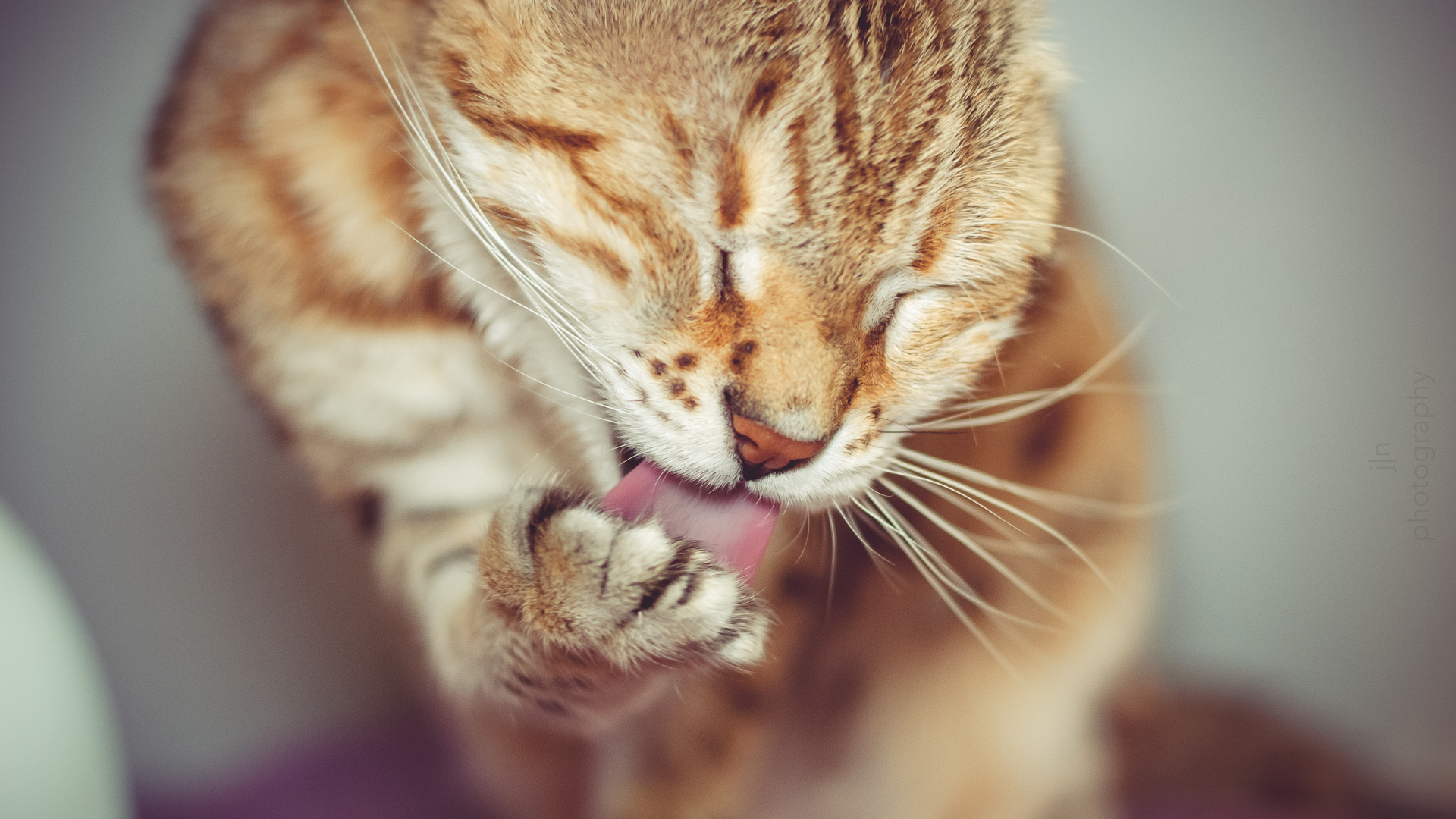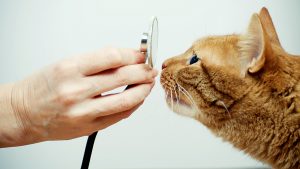Reprinted with permission from Cornell Feline Health Center
New conclusions about FIV-infected and non-infected cats living together:
Study #1 – Adopting FIV Positive Cats
Study #2 – FIV Positive Cats Can Live Harmoniously with FIV Negative Cats
What is Feline Immunodeficiency Virus?
Virologists classify feline immunodeficiency virus (FIV) as a lentivirus (or “slow virus”). FIV is in the same retrovirus family as feline leukemia virus (FeLV), but the viruses differ in many ways including their shape. FIV is elongated, while FeLV is more circular. The two viruses are also quite different genetically, and the proteins that compose them are dissimilar in size and composition. The specific ways in which they cause disease differ, as well.
How common is the infection?
FIV-infected cats are found worldwide, but the prevalence of infection varies greatly. In the United States, approximately 1.5 to 3 percent of healthy cats are infected with FIV. Rates rise significantly -15 percent or more – in cats that are sick or at high risk of infection. Because biting is the most efficient means of viral transmission, free-roaming, aggressive male cats are the most frequently infected, while cats housed exclusively indoors are much less likely to be infected.
How is FIV spread?
The primary mode of transmission is through bite wounds. Casual, non-aggressive contact does not appear to be an efficient route of spreading FIV; as a result, cats in households with stable social structures where housemates do not fight are at little risk for acquiring FIV infections. On rare occasions infection is transmitted from an infected mother cat to her kittens, usually during passage through the birth canal or when the newborn kittens ingest infected milk. Sexual contact is not a major means of spreading FIV.
What does FIV do to a cat?
Infected cats may appear normal for years. However, infection eventually leads to a state of immune deficiency that hinders the cat’s ability to protect itself against other infections. The same bacteria, viruses, protozoa, and fungi that may be found in the everyday environment–where they usually do not affect healthy animals–can cause severe illness in those with weakened immune systems. These secondary infections are responsible for many of the diseases associated with FIV.
What are the signs of disease caused by FIV?
Early in the course of infection, the virus is carried to nearby lymph nodes, where it reproduces in white blood cells known as T-lymphocytes. The virus then spreads to other lymph nodes throughout the body, resulting in a generalized but usually temporary enlargement of the lymph nodes, often accompanied by fever. This stage of infection may pass unnoticed unless the lymph nodes are greatly enlarged.
An infected cat’s health may deteriorate progressively or be characterized by recurrent illness interspersed with periods of relative health. Sometimes not appearing for years after infection, signs of immunodeficiency can appear anywhere throughout the body.
How is infection diagnosed?
Antibody tests detect the presence of antibody in the blood of infected cats.
Positive Results
Negative Results
How can I keep my cat from becoming infected?
The only sure way to protect cats is to prevent their exposure to the virus. Cat bites are the major way infection is transmitted, so keeping cats indoors – and away from potentially infected cats that might bite them – markedly reduces their likelihood of contracting FIV infection. For the safety of the resident cats, only infection-free cats should be adopted into a household with uninfected cats.
Vaccines to help protect against FIV infection are now available. However, not all vaccinated cats will be protected by the vaccine, so preventing exposure will remain important, even for vaccinated pets. In addition, vaccination may have an impact on future FIV test results. It is important that you discuss the advantages and disadvantages of vaccination with your veterinarian to help you decide whether FIV vaccines should be administered to your cat.
I just discovered that one of my cats has FIV, yet I have other cats as well. What do I do now?
Unfortunately, many FIV-infected cats are not diagnosed until after they have lived for years with other cats. In such cases, all the other cats in the household should be tested, as well. Ideally, all infected cats should be separated from the non-infected ones to eliminate the potential for FIV transmission. If this is not possible – and if fighting or rough play is not taking place – the risk to the non-infected cats appears to be very low.
How should FIV-infected cats be managed?
How long can I expect my FIV-infected cat to live?
It is impossible to accurately predict the life expectancy of a cat infected with FIV. With appropriate care and under ideal conditions, infected cats can live a normal life span. If your cat has already had one or more severe illnesses as a result of FIV infection, or if persistent fever and weight loss are present, a much shorter survival time can be expected.
My FIV-infected cat died recently after a long illness. How should I clean my home before bringing in a new cat?
Feline immunodeficiency virus will not survive outside the cat for more than a few hours in most environments. However, FIV-infected cats are frequently infected with other infectious agents that may pose some threat to a newcomer. Thoroughly clean and disinfect or replace food and water dishes, bedding, litter pans, and toys. A dilute solution of household bleach (four ounces of bleach in 1 gallon of water) makes an excellent disinfectant. Vacuum carpets and mop floors with an appropriate cleanser. Any new cats or kittens should be properly vaccinated against other infectious agents before entering the household.
Can I become infected with FIV?
Although FIV is a lentivirus similar to HIV (the human immunodeficiency virus) and causes a disease in cats similar to AIDS (acquired immune deficiency syndrome) in humans, it is a highly species-specific virus that infects only felines. A number of studies have failed to show any evidence that FIV can infect or cause disease in people.
Why should I have my cat tested?
Early detection will help you maintain the health of your own cat and also allow you to prevent spreading infection to other cats.
Under what circumstances should FIV testing be performed?








